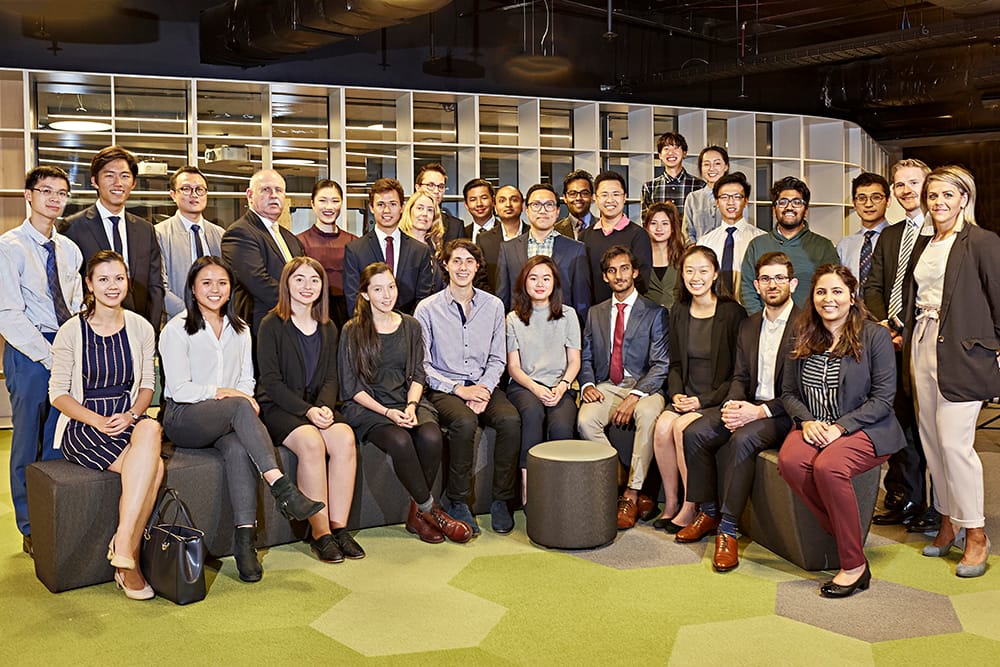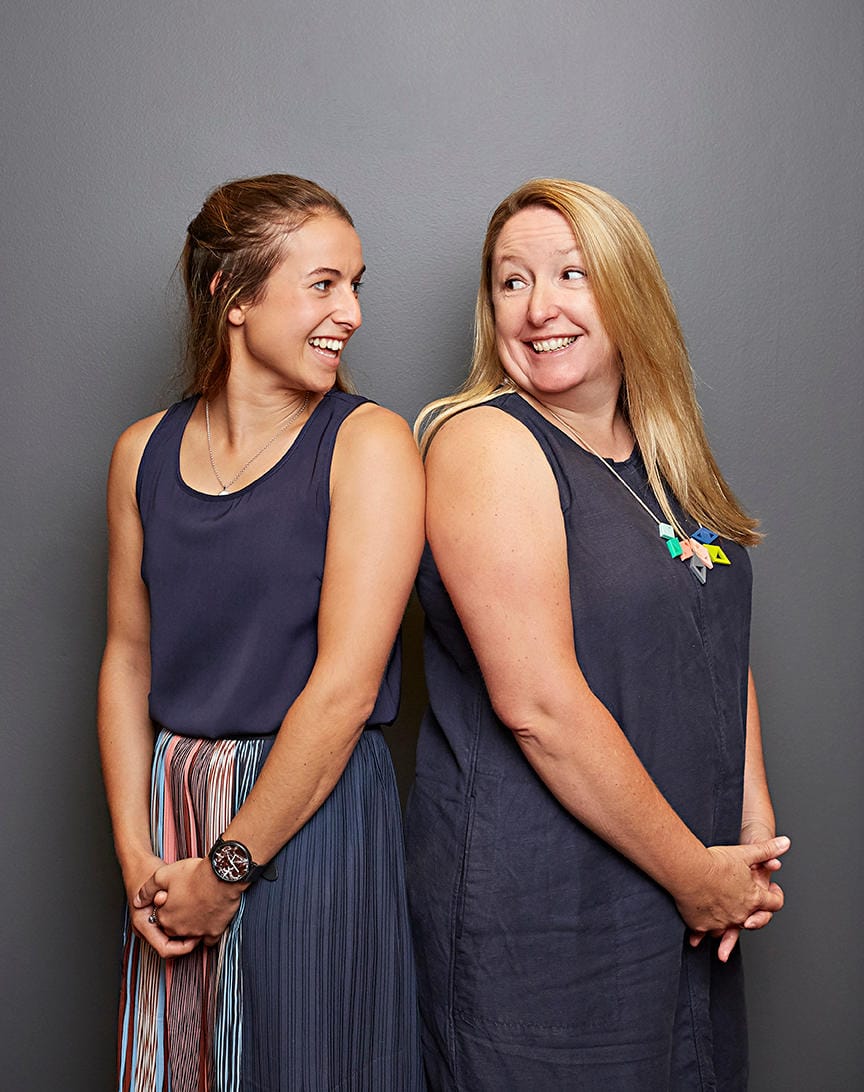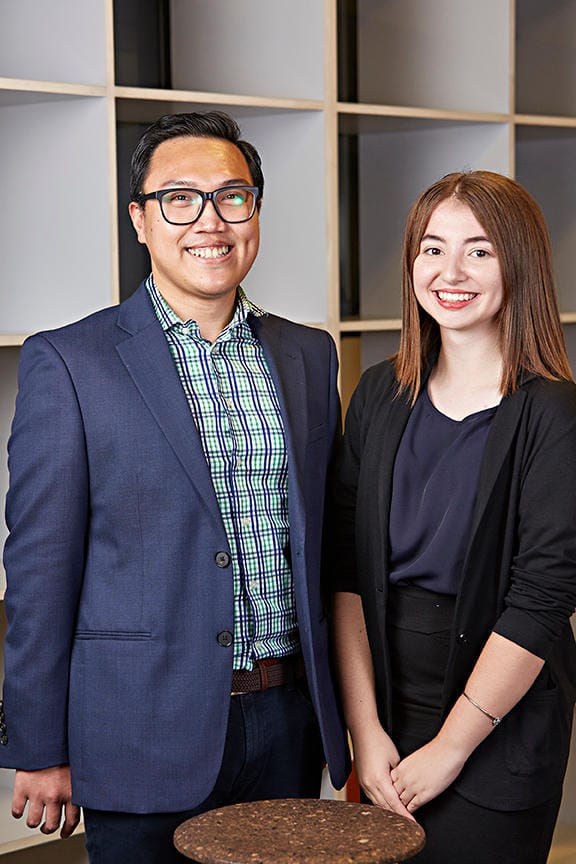
Fiona Milo and Emily Wilson
Master of Education graduate Fiona Milo didn’t give it much thought when she ticked a box in a survey indicating she’d be willing to take on a mentoring role in the future.

But just a couple of years later, after being invited to participate in the Betty Amsden AO Alumni Mentoring Program of 2017, she understood the significance of the program that had paired her with fourth-year teaching student Emily Wilson.
“I was blown away that I was asked to take part, and it was such a positive experience,” she says. “I think it was beneficial not only for Emily, but for me as well.”
Being a recent graduate herself, Fiona was able to help Emily navigate the path beyond the university gates and into the workforce. Emily says Fiona’s advice on life after university was invaluable, opening her eyes to the idea of working as a casual relief teacher (CRT) rather than going straight into a permanent position.
“I was a bit anxious about the thought of scoring myself a full-time job and CRT wasn’t on the agenda, but Fiona gave me a great insight into what it was like, and that it was doable,” she says.
With travel plans, including overseas teaching inspired by a fourth-year placement in a Malaysian school, Emily took the more “flexible” CRT route.
“It’s been awesome,” she says. “I’ve been able to go to a range of schools, really practise my teaching, network with different schools and get my foot in a lot of doors.” And they’re doors Emily is now confident will open when she’s ready, having already been offered two positions.
Emily was hand-picked for a place in the Betty Amsden program; she’s a mentor herself to two VCE students through the Access Monash Mentoring Program, which she decided to join after seeing a flyer at Monash and thinking, as an aspiring teacher, it would be a good experience. She’s also mentor-leader to other student mentors involved in Access Monash.
She says being part of the two programs – as both a mentee and mentor – has helped in each of her roles, giving her confidence as a mentor helping to prepare secondary school students for university, and refining her needs as a mentee.
Fiona, who describes the situation as a “pyramid of mentoring”, has revelled in her role as mentor, which she says has built her confidence and improved her ability to relate to graduate teachers.
“It definitely gave me the courage this year to put my hand up to be a team leader at school,” says Fiona, a prep teacher at Tulliallan Primary School in Melbourne’s southeast.
Emily says Fiona’s mentoring has been invaluable, ranging from practical advice on careers and the teacher registration process, to seeing teaching in action through visits to her school, and the added bonus of simply being a friend.
Their relationship has continued beyond the scope of the program.
“We have a lot in common,” says Fiona, who, like Emily, was a graduate of the Monash Berwick campus. “It’s a perfect fit.
Dr Zahrul Ismadi and Cheyenne Rain Travis
It’s mentor Dr Zahrul Ismadi’s insights into the “hidden curriculum” that second-year medical student Cheyenne Rain Travis has found most insightful. Things such as establishing professional relationships, networking, creating a resume and even starting a LinkedIn account.

“And Zahrul isn’t even on LinkedIn himself,” Cheyenne says. “So he might recommend things he wouldn’t do, but are appropriate for me, which is really good, because it means I’m not just a shadow of him.”
Matched through the Sir John Monash Mentoring Program for high-achieving students, Zahrul, a paediatric endocrinology and chemical pathology registrar with NSW Health Pathology, and Cheyenne, at Monash University’s Clayton campus, converse by Skype or phone on an as-needs basis.
“It’s very mentee-driven and tailored to what I need at the time,” says Cheyenne, who provides Zahrul with an email before their discussion with what’s on her mind. “For example, I’m about to go to the Pacific Region Indigenous Doctors Congress, so we’ll talk about navigating that.”
For Zahrul, this approach is a conscious decision, based on his own experience as a young doctor and mentee at Sydney’s Liverpool Hospital, where his mentor would ask him plenty of questions, encouraging him to find the answers himself.
“Mentoring is not so much telling people what they should do, but engaging them to be thinking critically about how a situation can be dealt with,” he says. “It’s not so much about giving answers, it’s about working things out together to find solutions.”
And through this process, he says, he often learns things himself. “I’ve picked up tips on how to deal with issues like time management or dealing with difficult people.”
Some of this he’s learned from Cheyenne, who he says is one of the most impressive young students he’s ever met. “She’s very proactive and very organised,” he says. “I think medicine is only one thing she will do in her life. I wouldn’t be surprised if she ends up as the minister for health.”
Cheyenne’s mother is of British descent, and her father is a Yorta Yorta and Wemba-Wemba man, and she wants to draw on her ability to navigate both cultures, integrating them to create better health outcomes for Indigenous people.
An aspiring surgeon, Cheyenne was encouraged to look into becoming a mentee through the Monash Minds Student Leadership Program in her first year at university. And because she’s “the type of person who says ‘yes’ to everything”, when she received an email about the Sir John Monash Mentoring Program, she didn’t hesitate to apply.
The experience, she says, has exceeded her expectations. “It’s very relaxed, and with Zahrul there’s no hierarchy. He has a lot of experience, but nothing is off limits.”
For Zahrul, the program provides a welcome opportunity to pass on his knowledge and help a new generation. “This is now a proper channel of personal development and sharing with other people,” he says.
MENTOR A STUDENT
If you’re interested in mentoring students please contact the Alumni Engagement team:
+61 3 9903 4602 or email: monashalumni@monash.edu





